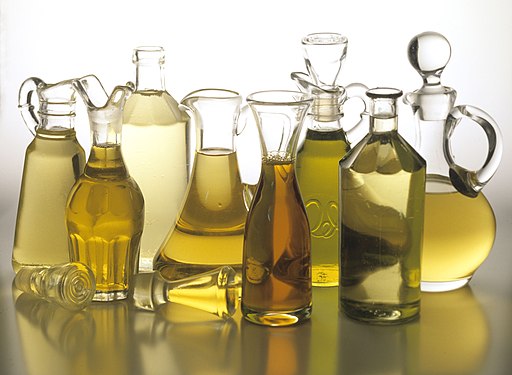Sunflower oil is derived from sunflower seeds, while vegetable oil is a generic term for oils from various plant sources, which may include sunflower oil.
TL;DR Sunflower oil Vs. Vegetable oil
Sunflower oil tends to have a higher smoke point compared to most vegetable oils, meaning it can withstand higher temperatures without breaking down and producing harmful compounds. This makes it ideal for deep-frying or high-heat cooking methods.
Vegetable oils may offer more variety when it comes to flavors and nutritional profiles due to their blend of different plant-based oils. However, they also tend to have lower smoke points than sunflower oil which may limit their use in certain types of cooking.
What is sunflower oil

Sunflower oil is a type of edible oil that is derived from the seeds of the sunflower plant. With its light golden color and mild flavor, it has become a popular choice for cooking and baking in many households.
One of the key characteristics of sunflower oil is its high smoke point. This means that it can withstand higher temperatures without breaking down or producing harmful compounds, making it suitable for various cooking methods such as frying, sautéing, and even deep-frying.
In addition to its versatility in the kitchen, sunflower oil also boasts several health benefits. It is rich in vitamin E, which acts as an antioxidant and helps protect our cells from damage caused by free radicals. Furthermore, it contains monounsaturated fats that have been shown to reduce bad cholesterol levels and promote heart health.
What is vegetable oil?
Vegetable oil is a commonly used cooking oil that is derived from various plant sources. Unlike specific oils like olive or coconut, vegetable oil is actually a blend of different oils extracted from seeds and nuts. This means that the composition may vary depending on the brand and the manufacturing process.
The main types of vegetable oils include soybean, canola, corn, safflower, and sunflower oil. Each type has its own unique taste and smoke point which makes them suitable for different cooking methods. For instance, soybean oil has a neutral flavor and high smoke point making it ideal for frying while olive oil is often preferred for salad dressings due to its distinct taste.
One advantage of using vegetable oil in cooking is its versatility. Its mild flavor allows it to complement a wide range of dishes without overpowering their natural tastes. Moreover, vegetable oils are generally more affordable compared to other specialty oils such as avocado or walnut.
However, there have been concerns raised about the health effects of consuming large quantities of vegetable oils due to their high omega-6 fatty acid content. While omega-6 fatty acids are essential nutrients needed by our body, an imbalance between omega-3s and omega-6s can lead to inflammation.
Sunflower oil Vs. Vegetable oil – Key differences
| Aspect | Sunflower Oil | Vegetable Oil |
|---|---|---|
| Source | Extracted from sunflower seeds | Generic term for oil from various plant sources |
| Flavor and aroma | Mild, neutral flavor and aroma | Can vary depending on the source, but often neutral |
| Smoke point | High smoke point, suitable for frying | Smoke point varies depending on the blend |
| Nutritional profile | High in vitamin E and low in saturated fats | Nutritional profile depends on the blend |
| Versatility | Suitable for high-heat cooking and deep-frying | Versatile for a range of cooking applications |
| Common use | Popular in various culinary applications | Used in many cooking and baking recipes |
| Varieties | Available in refined, high-oleic, and other variants | Various blends and types, including canola, soybean, and more |
| Availability | Widely available, often used in commercial food production | Widely available, commonly used in households |
Types of cooking oil

- Olive Oil: Known for its rich, fruity flavor, extra virgin olive oil is great for salads and low to medium-heat cooking. Regular olive oil has a higher smoke point for light frying.
- Canola Oil: Neutral flavor, high smoke point, and low in saturated fat make it versatile for most cooking methods.
- Vegetable Oil: Often a blend of different oils, it has a neutral taste and is suitable for frying, baking, and general cooking.
- Sunflower Oil: Mild flavor, high smoke point, and low in saturated fat, making it ideal for frying and baking.
- Peanut Oil: Mild flavor, high smoke point, and commonly used for frying, especially in Asian cuisines.
- Corn Oil: Mild flavor, high smoke point, and used for frying, baking, and in salad dressings.
- Soybean Oil: Neutral taste and high smoke point, suitable for frying, baking, and sautéing.
- Coconut Oil: Distinct coconut flavor, solid at room temperature, used in baking, cooking, and frying.
- Sesame Oil: Has a strong, nutty flavor and is often used in Asian and Middle Eastern cuisines for stir-frying and dressings.
- Grapeseed Oil: Mild flavor, high smoke point, and suitable for sautéing, frying, and baking.
Health concerns and controversy surrounding vegetable oils
There is ongoing debate and controversy surrounding vegetable oils, primarily due to health concerns related to their composition and processing. Here are some key issues and debates:
- Unsaturated Fats vs. Saturated Fats: Vegetable oils are generally higher in polyunsaturated and monounsaturated fats, which are considered heart-healthy. However, some argue that excessive consumption of polyunsaturated fats, especially omega-6 fatty acids found in some vegetable oils, may lead to an imbalance with omega-3 fatty acids and could contribute to inflammation and chronic diseases.
- Trans Fats: Partially hydrogenated vegetable oils, which contain trans fats, were widely used in processed foods and have been linked to heart disease. Many countries have banned or restricted trans fats, but some vegetable oils may still contain small amounts.
- Omega-3 to Omega-6 Ratio: The balance between omega-3 and omega-6 fatty acids in the diet is important. Some vegetable oils, like corn and soybean oil, have a high omega-6 content. An excess of omega-6 fatty acids relative to omega-3s can contribute to inflammation, which is linked to several chronic diseases.
- Refining and Processing: The refining process of vegetable oils may involve high heat and chemicals, which can lead to the loss of some natural antioxidants and nutrients. This has raised concerns about the potential formation of harmful compounds during processing.
- Genetically Modified Organisms (GMOs): Some vegetable oils, such as soybean and corn oil, are often made from genetically modified crops. This has led to concerns about the potential health and environmental impacts of GMOs.
- Sustainability and Environmental Concerns: The production of certain vegetable oils, like palm oil, has raised environmental concerns due to deforestation and habitat destruction.
- Individual Health Factors: The health impact of vegetable oils can vary from person to person. Some individuals may be more sensitive to the omega-6 to omega-3 ratio or have allergies to specific vegetable oils.
It’s important to note that not all vegetable oils are the same. Some, like olive oil and avocado oil, are generally considered healthier options due to their monounsaturated fats and lower omega-6 content. Moderation is key, and a balanced diet that includes a variety of fats, including sources of omega-3 fatty acids, is generally recommended. Consulting with a healthcare professional or registered dietitian can help individuals make informed choices based on their specific health needs and concerns.
Image Credits
Featured Image By – torange.biz, CC BY 4.0 , via Wikimedia Commons
Image 1 By – teteria sonnna from Obukhiv, Ukraine, CC BY 2.0 , via Wikimedia Commons
Image 2 By – Netojinn, CC BY-SA 4.0 , via Wikimedia Commons








